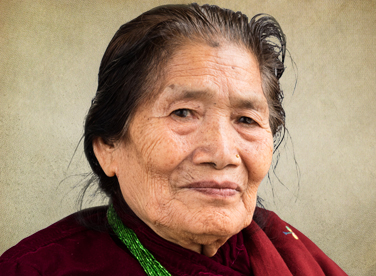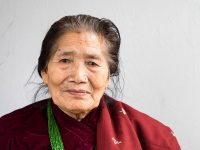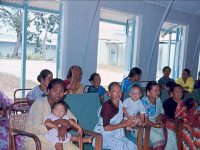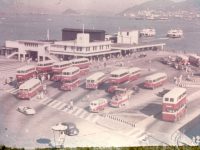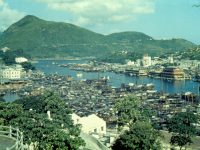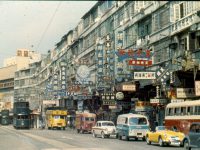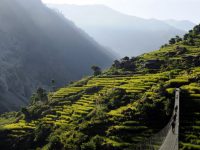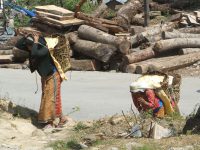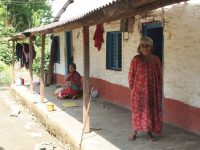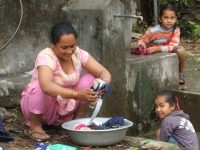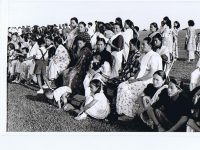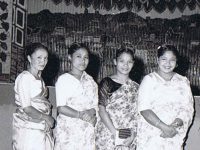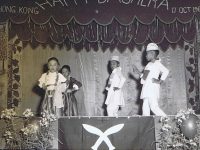Bhui Maya Rana
Bhui Maya Rana, Gurkha widow
(Portrait © Gurkha Voices Oral History Project)
Once a Gurkha soldier had served in the army for three years he was given his ‘Nepali leave’ of six months to return home for the first time since he joined up. It was his chance to show his village and family what he’d achieved. During this time, a soldier usually chose his wife through an arranged marriage. If they were lucky they could return together to his army base in Brunei, Hong Kong etc, but usually his wife would stay in Nepal for the next three years until he returned again. After his second Nepali leave a Gurkha usually had permission to return with his wife and live in the married quarters on base. This is the context for how the veterans for Gurkha Stories chose their wives between 1953 to 1986.
During our recording sessions with the veterans it was very clear how a Gurkha’s wife is the strong backbone to their family and home life. She is relied upon to run the home, the children’s lives for years and years separated from her husband. In fact, it wasn’t unusual to only live together for 3-5 years out of her husband’s 15 year career in the army. So we wanted to include some of the wives’ stories and their amazing perspectives of being a Gurkha’s wife.
-
Bhui in February 2015 (Photo: © Gurkha Voices Oral History Project)
-
Welfare Club Nee Soon, Singapore, early 1960s (Photo Godwin family, GTR)
-
Hong Kong airport c.1960
-
Hong Kong c.1960
-
Hong Kong, Hennessey c.1960
-
Goorkha Region, Bhiu's origins (Photo Jan Zalud)
Bhui Maya Rana arrived at Abbeygate House in Colchester in October 2014 after making the decision to live in the UK at the age of 80. Bhui’s husband, Hira Bahadur Rana, joined the British Gurkhas after 1947. They were married in 1948 when Bhui was 15 years old. Bhui joined her husband in Hong Kong and Brunei and briefly visited Singapore during her time as a Gurkha wife.
Sadly Bhui was widowed by the age of 35 after her husband passed away from fever and sickness. She also lost 3 of her 4 children to the same sickness within a twelve month period. It has not been easy for Bhui to live off her widow’s pension and for decades she has survived by being innovative with selling her crops from her subsistence farm land in Nepal and adapting to the various resources available to her.
Gurkha Stories has been given permission to use a selection of photos by Jonathan Godwin whose father, Bill, was a Major in the British Army in the 1950/60s with the 31 Squadron, Gurkha Transport Regiment in Sarawak, Hong Kong and Singapore. He took photos of the Gurkha wives and family events in this period. Although these are not Bhui’s photos they depict the environment she would have lived in when she stayed with her husband in Hong Kong and Brunei in the 1960s. Thanks to the Godwin family for the use of these evocative photos of this era.
(More of Bhui’s stories are in our book, published later this year. Keep posted via our blog)
Daily life in villages (photo: Sue James)
-
Depicts village life for Bhui in Nepal
-
Depicts village life for Bhui in Nepal
-
Depicts village life for Bhui in Nepal
Interview Extract 1 (based on interpreter's translation):
I lived in a place called Manakamana, and the nearest town I used to live near is called Gorkha. It used to take about one day [walk on foot, no cars]. So when I go in the morning, then I would get there in evening time. But for Pokhara, it used to take us three days to get there.
I didn’t go to school because there was no school there and I had to do farming and all the housework, I suppose like all the women did back in those days. I didn’t really like any of the work but I had to do it because I didn’t get to go to school.
So I used to wake up really early in the morning and we had to grind the corn and the wheat and we used to paint the house and resurface the house with the mud. I used to look after the cows and we had to fetch water as well and it used to be really far. And the hardest job I had to do isn’t specified because I really–, I had to do everything anyway, and sometimes I felt lazy to do some of the work, but I had to do it. I had sisters; one passed away when she was 7 and one passed away when she was 16, but I’ve still got other two sisters and they’ve both been married and they’re abroad. One is in Assam and one is in India. Now I can’t really remember much from when I was 16 or a teenager, and my only wish for now is, I wish I had my dad and mum alive. Yes, that’s the only wish.
There was a few of the army [Gurkhas] in our village and when they came back everyone in the village used to feel happy and excited. My husband was in the army as well, and how I met him was–, because he was a relative of mine. He was a son of my dad’s sister, so we could marry them [first cousins]. And so the marriage was arranged, and I was about 15 years old when I got married to him. And our village wasn’t far. It was just one hill and another hill, so we could just see each other. The wedding we had, it wasn’t that big, it was a small wedding, just a ceremony.
After marriage, my husband, he went to Singapore, but I didn’t go with him. So I stayed at my husband’s place with my mother in law and two of my sisters in law and I had to do my normal chores and all the duties.
And when my husband, when he was in Singapore, we didn’t really used to write letters to each other so much – one letter in six months. And the reason for that is that my husband, he didn’t study as well. He only knew English [from being in the army], and we had no translator in my village, so it was hard. And when I used to write letters to him I used to dictate to another travelling Gurkha to write the letters and take them back to his camp. I just used to say, “Oh, I’m fine,” and just reply to my husband’s letter. My husband used to write, “You can stay and I’ll come back soon, in one year or three years’ time,” and I used to feel really happy when the letter came.
When my husband left for Singapore I was pregnant and gave birth to a son. But three days later my son passed away. There wasn’t anyone in the village at that time who could write a letter to tell my husband what happened. About six months’ later, my husband walked to the village next to ours because he was repatriating one of the Gurkha’s families after that Gurkha had passed away. So when he came to visit me after settling this Gurkha’s family home, this was the first time he learnt of our son passing away.
My husband returned to Singapore for two years, but by then we had our second son. Eventually my son and I left the village to go and join my husband in Hong Kong when his turn came for permission for his family to join him there. It was the first time I went on the bus and train to Paklihawa and I got travel sick! But at first I thought it was a beautiful happiness coming from the village. And it was the first time I flew on an aircraft from Calcutta to Hong Kong and it was very exciting.
When we arrive in Hong Kong it’s a city called Kowloon, where my husband has been based. The next day he teach me everything about tap water, toilets, how to open the tap, that kind of thing. The same week I arrived in Hong Kong, my husband was posted with his regiment to Brunei so he left me with $180 Hong Kong dollars for the whole month to use for day to day expenses. There were a lot of Chinese shops, the grocery shops where normally Gurkhas buy things. The Chinese shopkeepers were used to the Gurkhas and their wives. I didn’t know anything about the dollars and I gave the whole $180 to the Chinese shopkeeper, but luckily he was very honest, so he only took the money that was necessary and returned the rest of it to me. Now I realise that at that time, $80 dollar was enough to buy the things for whole month.
-
Leisure time for families
-
Dashain festival c. 1960
-
Children of Gurkhas perform for Dashain c. 1960
Interview Extract 2 (based on interpreter's translation):
My husband retired from the Gurkhas in his early thirties and he returned to Nepal. By the age of 35 I was widowed and had lost my husband and 3 of my 4 children to fever and sickness. My husband he got a kind of illness, I don’t know what. And he passed away. Second, my daughter, who is the disabled daughter, she got fever, headache, all kind of things, then she’s just passed away. My son, he was coughing, fever, then he just passed away. The next one, or last son, the same fever happened, he just passed away. At that time I didn’t think I was going to survive, because I did have similar illness like my husband and the other children, and I was very weak. I used to rely on the stick to walk.
When my husband, three children, passed away, I had to go big battle to collect my widow pension. It took me three years to sort out that pension, because there were a lot of bureaucracy going on, so I had to fight for my widow pension.
When I fight for my pension, I didn’t have money so I had to borrow money from others. Then I used to go camp, the British Gurkha camp, the pension camp. Every time when I go there, they saying, “Your pension has not arrived yet.” Every time the same thing they telling me.
So I was really cross and by that time I wasn’t frightened to speak out with anyone, and I said to the staff who keep refusing, saying “Your pension is not arrived yet.” I said, “Give me 100 rupees or I’ll go to Paklihawa to complain or find out more.” And at the same time I asked, “Where are the British officers? I want to speak with them to find out exactly what’s going on.” I wasn’t happy with the individual who kept telling me, “Your pension is not there.”
Then they told me, “Come back at 12 o’clock.” On the same day I received a pension, all three years’ total, 1,600 rupees.
I arrived in UK on 11th October 2014. I’ve been in Hong Kong, Singapore, Brunei and I thought, why not go and stay in the UK, see the UK, what it looks like. But some of my friends in Nepal said to me, “When you die in UK, no one looking after you. It’s just a very sad place.” But I decided, “Okay, when you die you will die anywhere, not only UK, anywhere in the world, so I must go and see UK, what it’s like.”
I am really, really happy because where I live in the special Abbeygate House now is really warm. I don’t need to worry about freezing. I feel great there, it’s warm, I cook whenever I want to eat, I don’t need to wait for someone or look after someone, I make my own decisions. I’m really happy to be in the UK.
Oral histories: © Gurkha Voices Oral History Project

